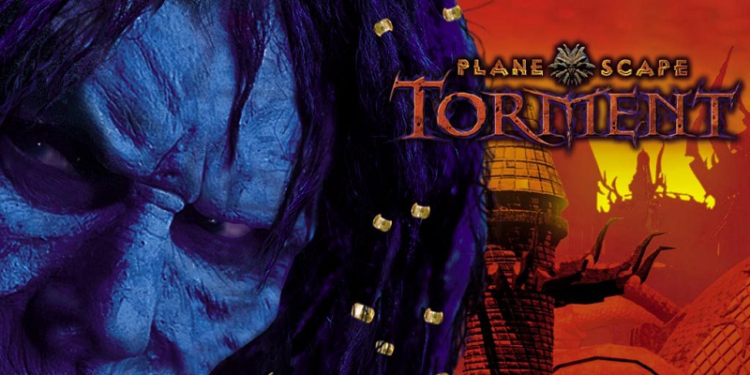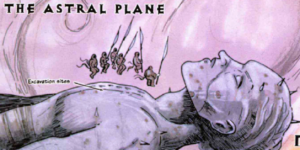Planescape: Torment and Personal Stories in Tabletop

** This article contains discussion of Planescape: Torment. If you wish to remain unspoiled on this 18 year old game, you should avoid it. You can trust me, I’m a skull.**
I was way too overhyped for the launch of the Planescape website last Tuesday. My expectations were absolutely through the roof as I was imagining the announcement of a Storm King’s Thunder style book centered around the Orcus/Tenebrous 2e adventure series. I had seen a trailer for the Planescape: Torment: Enhanced Edition some weeks previous so I had assumed this couldn’t possibly be the reveal. As you can verify by checking out the site, this was totally the reveal. As someone who has 3+ copies of the original game that I feverishly pressed into the hands of every person I knew to try and convince them to play this masterpiece, I might not be the target audience with this one. At first I was disappointed, but as I read comments from people around the internet I realized so many people had never played the game. Instead of being sad, I became elated. So many people are going to get a chance to not only experience an incredible game, but they will have a chance to play a game that is centered solely around understanding the self and coming to terms with who you are. For a lot of people, this might be the first time they experience the awesome potential of the personal nature of D&D.
Now, people will probably tell me of a thousand different games I have heard of that do exactly what I described above. In fact, I will get ahead of a famous game franchise and say that while Mass Effect certainly flirts with these themes, there is still a component of grand adventure attached to the personal moments of the characters. That’s in large part because Shepard is a blank slate rather than fleshed-out character. Sacrificing yourself to save the universe is certainly coming to terms with your mortality, but in a completely different way than in Planescape: Torment. The biggest difference? It’s not about the fate of the universe, saving your race, or even about power or heroic deeds. It’s about the main character, the Nameless One, coming to terms with who he used to be and who he wants to be in the future. While it’s not the first story of its ilk, it is placed in a gonzo setting and tied explicitly with D&D. In short, it’s everything about why I love Planescape.

Everything Is Personal
The setting might seem at odds with the above statement. Planescape is a setting where you mine the bones of forgotten, fallen deities now adrift and decaying in the Astral Plane so that you can attain the D&D version of ichor. Of course, big, cosmic stories were an attempt for humans to understand more about themselves and contextualize the world around them. Is it so far-fetched to believe that Planescape does exactly that with all of its best stories – Planescape: Torment included – to ground the fantastic in an approachable way?
Sure, you have a silent figure that rules a city that is built upon the inner ring of a torus atop a giant spire in one of the outer planes, and this figure punishes those who would call her a god – wielding enough cosmic might to make deities stay away from Sigil. This gives the people living in Sigil more agency. Here – at the center of the planes – mortals are free to go anywhere and do anything, aligning themselves into groups that are similar ideologically with the ultimate goal of spreading their humanistic ethos across the planes. These people live with the gonzo and wild all of the time, but they don’t care. Sure, that god might throw volcanos that unleash fire bees…but as long as he has a permit and the proper oversight, then the Guvners are fine with this. Well, provided the lava honey is also regulated and taxed appropriately.
Planescape: Torment takes this one step further, beginning at an ending that isn’t an ending and asking grounding questions from the very first moment. You’re dead. You’re so dead you are in a mortuary. You have no memory of who you are, how you got there, or why you are not dead. Good thing you have a floating skull willing to help you escape this death trap. You’ve got tattoos all over you. It seems you’ve gotten these tattoos to help you remember your life (it should be mentioned that Planescape: Torment came out before Memento) and what you are supposed to be doing. Even then, you can’t do this without help. Morte, the floating skull, reads some of these off for you, but you eventually realize you might not even be able to trust what he says as one of your tattoos reads, “don’t trust the skull.” In your escape, you come across the ghost of your former lover, who equally loves you and condemns you; encounter a zombie that seems to know you; and learn you should find a dude named Pharod.
This is the important stuff in the game – asking questions like “who am I?,” “what have I done?,”, and “am I always the sum of my past choices?” You can’t ever truly die – which is a great game mechanic – but your immortality is a story inconvenience rather than a sign of power. The same is true for your ability to swap between the different D&D classes. It’s played as remembering pieces of your past incarnations rather than you learning new skills. You were already an amazing wizard, if you want to pursue that path you went down before – knowing it ended in your death because you are already here – then go right ahead. In fact, you know without a doubt that every single choice you have ever made has led to your death in the past. To make matters worse, you are constantly damned to never know the choices you made.

The Ol’ Hag in a Besotted Lover Suit Trick
The Nameless One sought out power and ended up committing a horrible crime that is breaking apart the planes. Sure, this is all Morte’s fault – getting him to confess his sins to you is amazing – but that’s not the point. The Nameless One realizes he will be condemned to fight in the Blood Wars for all eternity (How familiar with the Blood Wars are you exactly? You don’t know anything about the Blood Wars? Oh boy. I envy you. The Blood Wars started when…), and decides to find a path to immortality so he has the opportunity to atone for his sins and escape his fate. All things being equal, the Nameless One is John Constantine. You can slice this up however you want to, but it’s true. Like Constantine, the reasons for his actions are self-serving, and it’s not a manifestation of his desire to truly be better. He just wants to skip out on paying the bill. That might not be a big deal if you are running for political office, but it is a sticking point if you made deals that condemned you to an eternity of torture.
The next course of actions is a master class in using a cosmic tale to tell a personal story. Morte feels bad that he tricked the Nameless One, and directs him to find the powerful night hag (man, I love Planescape’s use of traditionally under-represented creatures) Ravel Puzzlewell. Ravel wanted payment for her services, but the Nameless One challenges her to a riddle that is central to the conceit of the game – what can change the nature of a man? While she faces this quandary, the Nameless One seduces her and proceeds to convince her to make him immortal so they can spend eternity together. Unfortunately, this goes sideways, and the mortality of the Nameless One splits off from him entirely – the mortal part of him becoming known as the Transcendent One – leaving him immortal, but reborn as an entirely new person with no memories, each time he dies. In her sorrow, Ravel offers him three wishes. The first is to know who he is, but he experiences so much pain and suffering he immediately makes his second wish to forget. Having forgotten, he makes his third wish to know. This time, he has run out of wishes and Ravel leaves him, suffering equally in grief.
This is really interesting because it gives the story you are living through in the game a different twist. While the Nameless One doesn’t remember anything when he dies, you do. Does this allow the Nameless One to make better and different choices than he ever has before? Or does the story suppose the Nameless One was Other-controlled the entire time? Well, there is evidence to support both explanations, but I actually tend to believe the second one more than the first. The mortality has left the Nameless One, and not in a way that is typical. It was split from him entirely. For many immortal beings, this means freedom of choice has been taken away from you. In the case of the Nameless One, various incarnations of him actively work against previous and future incarnations of him, but all eventually end up following the same path – one that leads them to the Transcendent One. Instead of being able to enjoy the fruits of his immortality, he is forced to relive his past deeds, while always moving towards the same end. Despite the incarnations behaving differently, the story remains the same. Even when you change the situation with your playthrough, you end at the beginning. The lesser cycle is broken, but the greater cycle is not.
Cosmic Lessons
We all know single-player video games aren’t tabletop games. I’m not suggesting you should attempt to run this as a campaign, nor am I suggesting you give all of your players amnesia every time you begin a game. If it works for your story, then go for it. The takeaway should be that despite a story that has you exploring different planes, walking around with a tiefling and a floating skull, and dealing with an immortal power-broker night hag, Planescape: Torment is focused entirely on the core developmental parts of storytelling. It’s fine to have the characters storming a fortified citadel controlled by a powerful, near immortal being. but it is more impactful if the characters are doing so because it matters to them. Not mattering in a world-impacting sense, but it matters to them because it helps them find out more about themselves and answer those questions central to what makes them who they are. I’m also not talking about this in a macro-sense.
A paladin wants to stop the tyrant because the tyrant is oppressing villagers, sure. What is it about the tyranny that bothers her? What steps will she go to in order to stop the tyranny? What’s an acceptable level of control over a populace? In the quest for law, is there ever a time where tyranny can be acceptable? Importantly, why are those the limits for the paladin, and what does that say about her? If her answers are all, “because my order believes so” then why does the paladin have such a dogged devotion to the order, and so on. This can all be told with something as small scale as breaking up gangs in Waterdeep, but it can also play out easily on a cosmic level where morality is less of a certainty because the way you align yourself can drastically differ from more restrained settings. You can walk through individual parts of character personas in a way that is harder in settings with more definition.
This matches perfectly with what humanity has been doing for centuries. We told stories of gods, monsters, and the supernatural in order to understand the world around us and our purpose in it. We told stories of knights and dragons only after we told stories of gods creating rivers through ejaculation, and of the night sky and the world being gods that are cursed to forever remain apart. Only after we understood ourselves and our world were we able to expand and embellish the tales we tell.
Why is it so strange that telling stories of the cosmos can do the same thing for characters we play?




